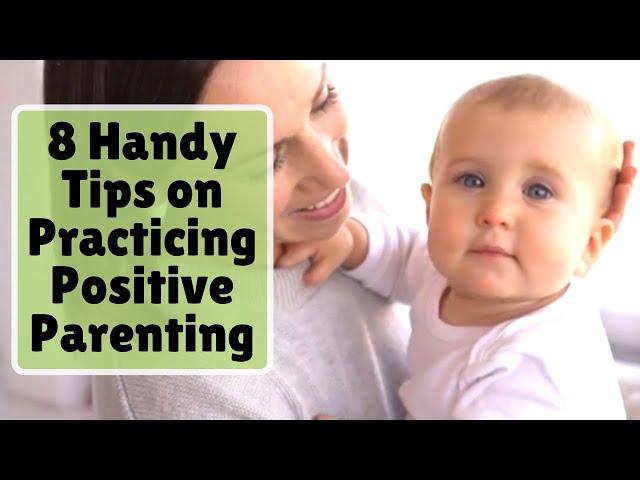
8 Handy Tips on Practicing Positive Parenting
In this video, we’re going to share 8 handy tips on how to practice Positive Parenting effectively.
Understanding the principles behind positive parenting, and what positive parenting actually means is all worth nothing if you do not know how to implement it into your family’s life.
Follow these 8 tips and you’ll be well on your way to practicing Positive Parenting!
#1 Treat the Cause of Bad Behavior
Bad behavior does not mean a bad child.
It means that there is something else off, and it is just a symptom of a bigger cause. You need to treat the cause and not the symptoms.
If your child is constantly hitting her sibling, it might have to do with jealousy. If your child feels like she needs to compete for attention, this might show up as bad behavior.
Try to understand the underlying problems so you can work with your child to better the situation.
#2 Avoid Saying No
Avoiding saying no can have quite a profound impact.
We overuse the word ‘no’ so much with our children that it starts to lose its meaning.
Instead of telling your child no, which they probably won’t listen to, it’s your responsibility to redirect them.
#3 React with Empathy and Logic Towards Stressful Situations
As the parent, you need to set the example.
You also need to make parenting a positive experience, creating a fun and rewarding environment, instead of surrounding yourself with stress and chaos.
Do not react to your child with anger or irritation. Address the situation with empathy and logic.
Reacting negatively, shouting, or being irrational can just aggravate your child’s emotional state even more.
Empathize. Consider what your child is feeling, talk to them calmly and respectfully, and present consequences later on once your child is out of the fight-or-flight mode and is able to absorb what they have done.
#4 Set Limits
Your child will learn boundaries when you set clear limits.
For example, instead of engaging in an argument with your child, acknowledge them and then walk away.
As a result, your child will learn not to argue in an emotional state and will understand the boundaries.
#5 Give Them A Voice
While you should not argue with your child, they do need to feel heard.
It is important to set up a time each week for your children to come to you and present their feelings and opinions with you listening and there being no arguing.
This gives the whole family a chance to air their concerns and open up the floor to solutions.
#6 Do Not Shame Mistakes
Don’t make your child feel ashamed of their mistakes.
Have open, positive conversations about mistakes, and reinforce the idea that mistakes are merely opportunities to learn.
Speak about your mistakes made each day and what you have learned from them.
This will help your child feel encouraged and more positive about making mistakes.
#7 Make Quality Time
It is so important to prioritize quality time with your child.
Not every family is the same, and the quality time you spend with your child will depend on their age as well.
It might mean special story time with your toddler each night, or a milkshake date with your teenager once a week.
This helps boost their self-esteem and reinforces their feeling of being loved, which will reflect in better behavior.
#8 Be A Leader
As a parent, you need to set your child up for success.
You need to lead them on the right path, but you should not control them.
Stray away from giving them commands, and instead pose questions to them to make them feel as though they are making the choice to cooperate.
Children will behave well on their own if they see parents as being on their team, and not as the police.
How Do I Learn About Positive Parenting?
Positive parenting is becoming a norm with how families choose to raise their children.
Because of this, there are so many resources available for parents to use to learn about positive parenting.
You can find resources online, reading up on research articles and different opinions and experiences.
There are also some online courses you can take which will walk you through the different aspects of positive parenting, and how you can implement it in your life.
You can also look for parenting classes around your area that focus on teaching positive parenting.
This is a great opportunity to have face-to-face time with experts in the field and to engage and ask questions.
You will also meet parents in the same situation as you, which could help you build a support system.
What do you think about these 8 steps on how to practice positive parenting?
We’d love to hear from you! Let us know in the comments section.
Check out https://www.stuff4tots.com/positive-parenting/ for more information on Positive Parenting.
This presentation contains images that were used under a Creative Commons License. Click here to see the full list of images and attributions:
https://link.attribute.to/cc/442744
Understanding the principles behind positive parenting, and what positive parenting actually means is all worth nothing if you do not know how to implement it into your family’s life.
Follow these 8 tips and you’ll be well on your way to practicing Positive Parenting!
#1 Treat the Cause of Bad Behavior
Bad behavior does not mean a bad child.
It means that there is something else off, and it is just a symptom of a bigger cause. You need to treat the cause and not the symptoms.
If your child is constantly hitting her sibling, it might have to do with jealousy. If your child feels like she needs to compete for attention, this might show up as bad behavior.
Try to understand the underlying problems so you can work with your child to better the situation.
#2 Avoid Saying No
Avoiding saying no can have quite a profound impact.
We overuse the word ‘no’ so much with our children that it starts to lose its meaning.
Instead of telling your child no, which they probably won’t listen to, it’s your responsibility to redirect them.
#3 React with Empathy and Logic Towards Stressful Situations
As the parent, you need to set the example.
You also need to make parenting a positive experience, creating a fun and rewarding environment, instead of surrounding yourself with stress and chaos.
Do not react to your child with anger or irritation. Address the situation with empathy and logic.
Reacting negatively, shouting, or being irrational can just aggravate your child’s emotional state even more.
Empathize. Consider what your child is feeling, talk to them calmly and respectfully, and present consequences later on once your child is out of the fight-or-flight mode and is able to absorb what they have done.
#4 Set Limits
Your child will learn boundaries when you set clear limits.
For example, instead of engaging in an argument with your child, acknowledge them and then walk away.
As a result, your child will learn not to argue in an emotional state and will understand the boundaries.
#5 Give Them A Voice
While you should not argue with your child, they do need to feel heard.
It is important to set up a time each week for your children to come to you and present their feelings and opinions with you listening and there being no arguing.
This gives the whole family a chance to air their concerns and open up the floor to solutions.
#6 Do Not Shame Mistakes
Don’t make your child feel ashamed of their mistakes.
Have open, positive conversations about mistakes, and reinforce the idea that mistakes are merely opportunities to learn.
Speak about your mistakes made each day and what you have learned from them.
This will help your child feel encouraged and more positive about making mistakes.
#7 Make Quality Time
It is so important to prioritize quality time with your child.
Not every family is the same, and the quality time you spend with your child will depend on their age as well.
It might mean special story time with your toddler each night, or a milkshake date with your teenager once a week.
This helps boost their self-esteem and reinforces their feeling of being loved, which will reflect in better behavior.
#8 Be A Leader
As a parent, you need to set your child up for success.
You need to lead them on the right path, but you should not control them.
Stray away from giving them commands, and instead pose questions to them to make them feel as though they are making the choice to cooperate.
Children will behave well on their own if they see parents as being on their team, and not as the police.
How Do I Learn About Positive Parenting?
Positive parenting is becoming a norm with how families choose to raise their children.
Because of this, there are so many resources available for parents to use to learn about positive parenting.
You can find resources online, reading up on research articles and different opinions and experiences.
There are also some online courses you can take which will walk you through the different aspects of positive parenting, and how you can implement it in your life.
You can also look for parenting classes around your area that focus on teaching positive parenting.
This is a great opportunity to have face-to-face time with experts in the field and to engage and ask questions.
You will also meet parents in the same situation as you, which could help you build a support system.
What do you think about these 8 steps on how to practice positive parenting?
We’d love to hear from you! Let us know in the comments section.
Check out https://www.stuff4tots.com/positive-parenting/ for more information on Positive Parenting.
This presentation contains images that were used under a Creative Commons License. Click here to see the full list of images and attributions:
https://link.attribute.to/cc/442744
Тэги:
#Positive_Parenting #Parenting_Tips #Parenting_Advice #positive_discipline #gentle_parentingКомментарии:
Australian Championships 2025 : Mens Teams Rnd 7 QLD Chalkmen v QLD Drop Bears
Blackball Australia Pool Association
Where to Find Modern Wargaming MINIATURES
The Solo Wargamer
Inside the Classroom at Perkins: Zach and Jacob
Perkins School for the Blind
How to Draw Anything | 3 Secrets!
Fragile Glory Impressions
2025.04.16 八度空间早晨新闻 ǁ 9:30AM 网络直播
八度空间华语新闻
Anna Delvey Opens Up About New York City House Arrest (Exclusive)
Entertainment Tonight
Naître d'eau et d'Esprit / Apôtre Steve Kunda - IL EST ECRIT
OETV, la chaîne au service de l'Evangile


























